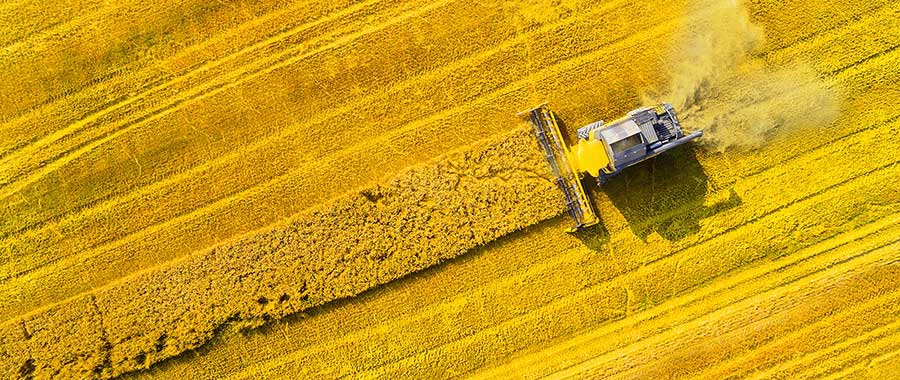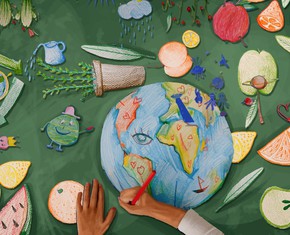The views expressed in our content reflect individual perspectives and do not represent the authoritative views of the Baha'i Faith.
Normally we think of the information age, cloud computing and the technology revolution in terms of bytes—but perhaps we ought to start thinking about it in terms of bites.
Our food—the way we create, grow, harvest, market and manipulate it—has become one of the new flashpoints of the information age.
In agriculture, for example, two parallel systems of innovation have existed since the mid-twentieth century. The Consultative Group on International Agricultural Research (CGIAR) coordinates research centers around the world that maintain seed banks for important crops and share seeds freely as they make crosses adapted to each local situation. They were behind the green revolution of the 1970s that allowed India to go from a country of famines to a food exporter.
Alongside this, the multinational agro-industries produce patented seeds, some with genetic engineering, adapted to their herbicides and other agricultural chemicals that they sell around the world for large-scale intensive agriculture, all designed to maximize their profits. In Canada, they so control prices that farmers are always close to bankruptcy, while all the profits of the agricultural sector are captured by corporate interests. Are monopoly monocultures or sustainable ecological diversity more in the common interest?
The Baha’i teachings say that “Special regard must be paid to agriculture,” noting that it “is conducive to the advancement of mankind and to the reconstruction of the world.” – Baha’u’llah, Tablets of Baha’u’llah, pp. 89-90. Abdu’l-Baha wrote that:
It is therefore clearly established that the appropriation of excessive wealth by a few individuals, notwithstanding the needs of the masses, is unfair and unjust … Such being the case, the best course is therefore to seek moderation, which is for the wealthy to recognize the advantages of moderation in the acquisition of profits and to show regard for the welfare of the poor and needy …
… the commercial, industrial and agricultural affairs, and even the general business of the nation, are intimately linked together: An impairment to one is a loss to all. – Abdu’l-Baha, Some Answered Questions, newly revised edition, pp. 316-318.
With those spiritual guidelines in mind, we now know that using the new information technologies of remote sensing, drones and other instruments, the same multinationals can offer information services on the state of crops and the localized treatments needed. These could help farmers to increase productivity, but all that information is captured by the corporations in big data that allows them to see the larger picture and to manipulate the whole agricultural system to maximize their profits, while farmers simply become passive consumers.
Another case is that of genetic information increasingly privatized by multinationals. For example the company that discovered certain genetic mutations associated with breast cancer patented them, so that anyone wanting to know if they were carriers had to go to them for expensive testing. One woman whose results were inconclusive wanted a second opinion, but the company refused to give her the analyses, and only after a long legal case did the court finally rule that genes could not be patented. Other companies have patented the genetic structures of certain plants and grains, extracting a profit when anyone grows them.
In a wider sense, even access to nourishing intellectual food—scientific discoveries and knowledge—has largely been privatized, as the major scientific journals have increasingly been bought up by multinational publishers who protect everything by copyright and require payment to read each individual scientific paper. Everything is available online, but if you do not have access to an academic library that pays high subscription fees, you have to pay. Here’s a personal example: I cannot even read my own publications, or those of my grandfather from a century ago, except for a high fee, up to $50. Scientists in poor countries are thus excluded from access to much scientific information, except for the few open-access journals.
Private property, of course, does make some sense for a scarce or singular resource. If I eat a sandwich, you cannot eat it too. But information is not like that. It can be printed in a book (requiring payment for paper and printing but readable by many people ever after), but also broadcast over radio waves or sent to a screen, at no cost increase as the number of users grows.
In fact, information is one of the unique commodities that becomes more valuable the more it is shared, benefiting and enlightening thousands or millions of people without diminishing the original information. With the internet, free access is universally possible as a public utility, although some companies would like to privatize it. The Baha’i teachings predicted its establishment almost a century ago, clearly viewing it as one of the many positive aspects of a shrinking and increasingly united world:
A mechanism of world inter-communication will be devised, embracing the whole planet, freed from national hindrances and restrictions, and functioning with marvellous swiftness and perfect regularity. – Shoghi Effendi, The World Order of Baha’u’llah, p. 203. (11 March 1936)
We know that free access to information has multiple benefits, from political transparency to health information to environmental warnings to a more informed populace. Free information access facilitates democracy and elections, and encourages public participation and civic engagement. It can also shed light on attempts to manipulate people, to incite hatred (as during the genocide in Rwanda), or even to wage cyberwarfare.
Additionally, it seems odd that the essential public service journalism provides to keep us informed should largely be financed by advertising for things we do not need. The Baha’i writings commented on this profit motive and its connection to journalism long ago, recommending that journalistic outlets free themselves from the control of vested interests and the inherent bias such control creates:
The press will, under such a system [of world governance], while giving full scope to the expression of the diversified views and convictions of mankind, cease to be mischievously manipulated by vested interests, whether private or public, and will be liberated from the influence of contending governments and peoples. – Shoghi Effendi, The World Order of Baha’u’llah, p. 203.
As one recent example of that principle, The Guardian newspaper decided to make its articles freely available online without ads, asking for contributions instead—and now receives more than it did from advertising.
Can you think of some other options for rewarding innovation and the creation of information and knowledge? There are public subsidies and research grants, employment as researchers in universities or institutes, prizes for innovation, and crowd-sourcing. Even the present system of intellectual property law could be modified to guarantee free access to information and discoveries, with a requirement that any profits from the use of those discoveries be shared with the original creator.
From the perspective of system science and the Baha’i teachings as well, it is the exchange of information between the different components that allows the system to organize and function. The more highly evolved and productive a system is, the more developed and diversified are its networks of information, communication and coordination:
… in the sight of God knowledge is the greatest human virtue and the noblest human perfection. To oppose knowledge is pure ignorance, and he who abhors knowledge and learning is not a human being but a mindless animal. For knowledge is light, life, felicity, perfection, and beauty, and causes the soul to draw nigh to the divine threshold. It is the honour and glory of the human realm and the greatest of God’s bounties. Knowledge is identical to guidance, and ignorance is the essence of error. – Abdu’l-Baha, Some Answered Questions, newly revised edition, pp. 154-155.
Limiting the circulation of knowledge and information by privatizing it deprives the poor, decreases our collective intelligence and slows the advance of our civilization.
You May Also Like
Comments

















Take genetic engineering, one of the earliest genetic engineering cases that has preambled the long history of ignoring and suppressing the real dangers of genetic engineering and GMO foods is the infamous tryptophan food supplement disaster of 1989 where the FDA ignored the warnings of their own scientists about the real risks of GMOs, simply to protect the business interests of the genetic engineering industry, which they've been colluding with for decades - see this article at https://www.supplements-and-health.com/l-tryptophan.html
These criminals deceive the public. All done by the ...control and use of information via propagandistic channels.